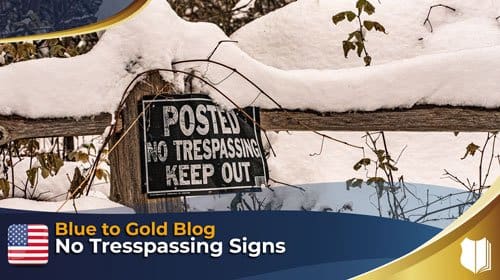Here is a question that we frequently encounter: Will a “No Trespassing” sign and a closed gate prohibit you from doing a knock and talk?
Let me give you some context here. Some deputies in a rural setting want to do a knock and talk on a burglary suspect. They don’t have probable cause to arrest him. Now the suspect lives on a 100 acre ranch. It’s fenced with barbed wire, and the driveway gate is closed, not just for privacy, but also to keep the cows in. It’s a gate to a working ranch, but the gate is not locked. There are several “No Trespassing” signs provided near the front gate.
About midday, the deputies open the gate and drive through. They close the gate behind them so they don’t let the animals out. They drive down a mile long driveway to reach the suspect’s house, and they talk to him.
We now have two questions. Number One is, are we good here on a knock and talk? Whether we are or not, question Number Two is; if we develop probable cause to arrest him, can we arrest him?
To begin to answer that, whether or not a knock and talk is lawful falls into the Girl Scout rule. It comes from a case called Florida versus Jordan’s, US Supreme Court. First, take the cop part out of it. I know your mission is to find out, but take the cop part out. The rule is; do you believe that the Girl Scouts could do the same thing without offending this person’s raised expectation of privacy or would they be trespassing on his property? Do you believe that he would expect or understand that some people would want to go to the ranch and try to sell him cookies? Do you believe that a politician looking for votes wouldn’t feel comfortable going up to the gate?
Context matters too in the sense of where this guy is. He’s on 100 acre ranch. So of course,
he’s supposed to have gates and fences. Also, it’s very common to put up barbed wire or razor wire around one’s property because people steal stuff. It’s remote, and the “No Trespassing” signs make sense. They signal; I don’t want you on my property for illicit purposes.
Now, the Ninth Circuit is a little tougher than most circuits. And even the cops in New York City know the reputation of the Ninth Circuit. They have a case that does talk about closed gates and “No Trespassing” signs near the front gate. And they held that that gave you a signal that you could not do a knock and talk.
That was not one of these ranch cases. That’s where the “No Trespassing” sign was right at the front of the yard and the closed gate. I’ve always been suspicious that a lot of people put up “No Trespassing” signs just because it’s routine to do that, especially on farms. I’m sure you’ll see a bunch of other “No Trespassing” signs on other peoples’ farms. It just kind of almost comes with the property.
So this can go either way. Your judge is going to matter on this one, because I’m going to lean towards it being lawful. The knock and talk is lawful. The gate is unlocked and we have a reason for the gate. It just makes sense. I don’t think that the Girl Scouts would be trespassing on this person’s property, just with those factors, and it makes sense that he has these things up in place.
However, there are reasonable minds that can differ with me. So that’s my first thing. Now, we don’t have an open field, so will it really matter, this fence? And the answer is; it does matter because it still sends a signal to you about whether this person must be left alone or not, even though passing through the gate would not violate the guy’s curtilage because curtilage cannot extend out that far. But again, I think you’re okay. I’m going to lean on the side of this being a lawful knock and talk, especially if it’s articulated correctly.
Now we come to the next question. Let’s say that we’re at the front door. If we did find that we have probable cause and he’s on his porch, can we hook him up? The answer is “yes.”
That’s US versus Santana, he’s within or outside of a threshold. He is arrested under the Fourth Amendment. Now, if he’s inside of his home, then he’s off limits. You would have to get district pre-approval unless you have some form of exigency: imminent escape, a legitimate officer safety issue, imminent destruction of evidence, that type of stuff.
That was a great question. Again, the ninth circuit is a little tricky, so I’ll want to hesitate on giving you a black and white answer on this one. I’m leaning towards “Yes,” but, at the same time it could go either way. Articulation is going to be key on this one, about why the general public could do the same thing that you did.
I hope you liked this. Until next time, my friends stay safe.











